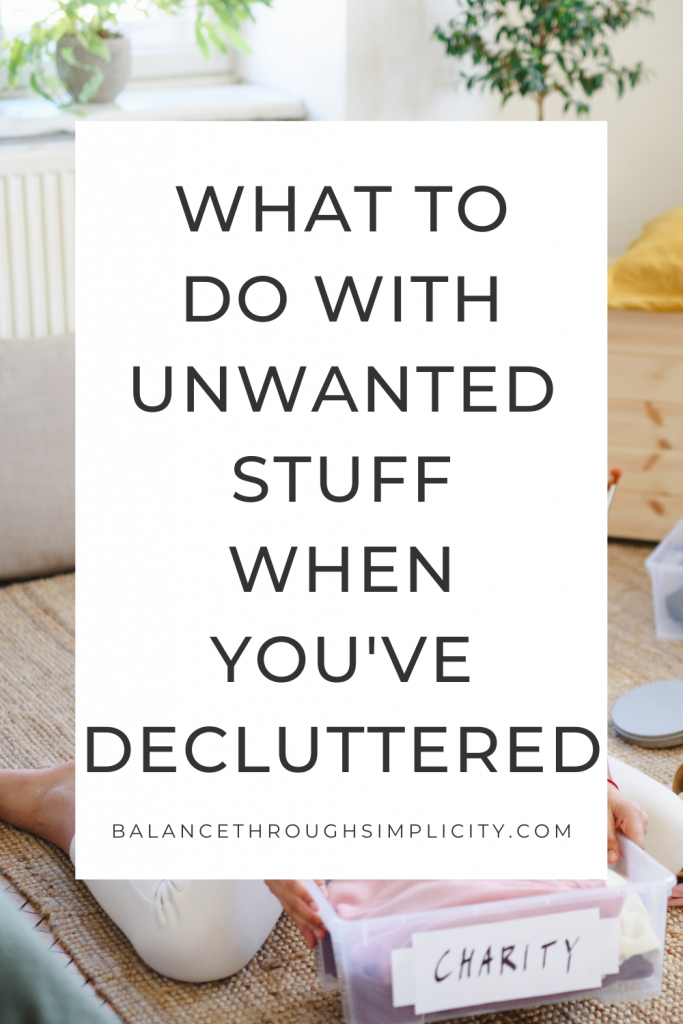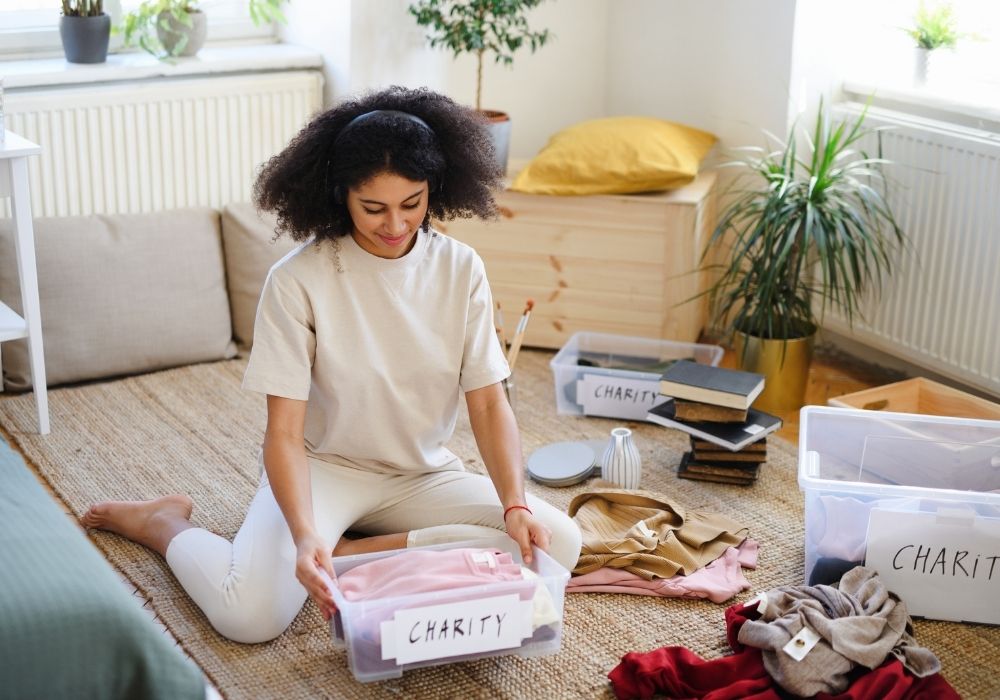WHAT TO DO WITH UNWANTED STUFF YOU’VE DECLUTTERED
Decluttering your home is one thing, but what do you do with the stuff you want to get rid of? In this article, we’re looking at what to do with unwanted stuff you’ve decluttered and some tips on getting rid of your decluttered items.
HOW TO GET RID OF YOUR DECLUTTERED ITEMS
In this article, we’re looking at what to do with unwanted stuff you’ve decluttered.
It’s an issue that comes up a lot. Once you’ve had a productive declutter session, if you don’t plan beforehand what you’re going to do with the unwanted items afterwards then it can cause a bottleneck and undo some of your good work.
There is plenty of advice on how to declutter your home, where to start, how to go about it and the benefits of clutter-free space. However, unless you know what you’re going to do with the stuff you want to get rid of, then your beautifully uncluttered home might look slightly more cluttered than you’d like! That’s both frustrating and demoralising.
You don’t want to waste your decluttering efforts only to have bin bags full of stuff sit in your garage or entrance way indefinitely whilst you work out what to do with them!
WHAT TO DO WITH UNWANTED STUFF YOU’VE DECLUTTERED
In this article I’m sharing some ideas to help you plan what to do with unwanted stuff you’ve decluttered so you can start to think about options that feel right to you.
1. Donate
Donating to charity is one of my favourite options because I’m giving to a good cause of my choice and it helps others. Someone out there needs or wants exactly what I’m throwing out, so it’s put to good use and I don’t feel guilty about letting the item go.
Do some research into what your local donation centres or charity shops will accept. Some will take clothes more than books or toys, for example, or vice versa. Check for opening times so that you can drop the stuff when they’re open instead of missing the opening times and having to keep your unwanted items in your car until they’re next open.
You may have donation drop-off points where you can take the stuff, particularly for clothes and books. These are handy if you’re dropping off items out of normal shop hours.
Other options you could explore are online sites such as Facebook Marketplace and Freecycle. Food banks are great if you’re decluttering your larder and kitchen cupboards.
Libraries, hospitals and community centres often welcome donations of books and toys.
2. Recycle
Recycling is good for the environment and the variety of materials we can recycle successfully and make use of in different ways is growing all the time. This is a great way to get rid of clothes, textiles, paper, cardboard and plastics.
3. Give to others
I’m reluctant to pass on my unwanted stuff to friends and family who often feel obliged to say yes. I don’t want the clutter in my home, but I also don’t want to just clutter up theirs! However, you could offer them what you don’t want as long as they don’t feel obliged to take it because they don’t want to upset you by saying no!
4. Throw away
I feel that most things that are damaged, worn out or past their sell by date should really be thrown away in the rubbish. They’re unlikely to be of good enough quality or nice enough to give to someone else or donate to charity. If you can repair them but still don’t want to keep them for yourself, then you might be able to do them up and donate or recycle.
5. Sell
I personally don’t recommend holding on to your unwanted items just so that you can sell them for money. The problem with this approach is that it requires planning and there are some pitfalls to consider:
- If you hold onto the stuff until you’ve found a buyer, it could take a while.
- The value we put on things is very often not the same as what someone is prepared to pay for them. So, we might not make as much money as we think we might.
- What are you going to do with the items in the meantime?
- Are they just going to lie around the home getting in the way?
- What if you agree a price with the buyer but they never collect it, or you never find a buyer at all?
- Will you hold onto the items indefinitely in the hope that one day someone comes to buy them?
Selling your stuff does, of course, make you some money. If you need the money, then do this by all means. But, if you can possibly avoid it, I would. You risk slowing down or even stopping your decluttering progress otherwise.
If something is very valuable then you definitely may want to consider selling it. However, make sure you find a good place to store the item(s) in the meantime so you won’t forget about it and it won’t get damaged. Set a reminder on your phone or calendar to do something else with it if you haven’t found a buyer within a set period of time.
There are many places you could sell your unwanted items including hosting a garage sale, doing a car boot sale, or online such as eBay or Facebook Marketplace.

WHAT TO DO WITH YOUR UNWANTED ITEMS UNTIL YOU GET RID OF THEM
At the start of this article, I mentioned the problem of your unwanted items taking up space and cluttering your home whilst you wait to get rid of them.
Not only does this create clutter but, if your family is like mine, they (or you) might be tempted to rummage through the bags one last time to double-check you haven’t got rid of something you might later regret.
This happened to me many times and it was so frustrating and demoralising. The best thing to do is to get the unwanted items out of your home as quickly as possible.
If this is difficult, create a place in your home (or garage or shed) where you can keep the stuff until you can next get rid of it. Make it a place that’s not too visible, but not somewhere that you’ll forget about it.
Put a reminder on your phone that pings up to remind you to deal with these items otherwise it might be a case of out of sight and out of mind.
Do what you feel is right and appropriate for your unwanted items. Be aware of the potential pitfalls of passing on or selling your items but if this is for you, then go for it!
IF YOU LIKED THIS ARTICLE
If you liked the tips in this article, want to save it for later or you think a friend might find it helpful too, please share it to Pinterest and your favourite social media!
MORE RESOURCES TO HELP YOU DECLUTTER
Here are some other articles and resources to help you declutter your home and simplify your life.
- 11 things to do before you start decluttering – A little time spent planning and preparing can make life so much easier. Here are some things to think about before you start decluttering
- Simplify Your Home – A guide and workbook to help you declutter your entire home, step-by-step with checklists to keep you on track (and keep that clutter away for good!)
- How to decide what to declutter and what to keep – Make the decluttering process much easier by getting clear on what you will and won’t get rid of
- How to declutter your home and life – A complete guide to decluttering with plenty of links and resources to help you tackle specific problems

